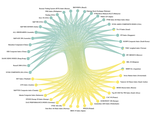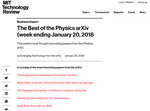About me
I am a Senior Data Scientist at Morningstar, Inc.
I currently work on developing a suite of tools for data extraction and information acquisition using Natural Language Processing, Pattern Recognition, and Generative AI.
I have 10+ years of experience as a researcher in data science and complex systems. I have experience in Machine Learning, Deep Learning, Bayesian Statistics, and Network Science and 24 peer-reviewed scientific publications that have amassed 900+ citations. I have mentored 10+ students in data science and complex network research.
Previously, I worked as a Data Scientist at Northwestern Institute of Complex Systems and as a Postdoctoral Fellow in the Amaral-Lab at Northwestern University. I was a Postdoctoral Fellow at the Institute of Mathematics and Computer Science at the University of São Paulo.
I have a bachelor’s degree in Physics (2012), a master’s degree in Physics (2014), and a Ph.D. degree in Physics (2017) from the State University of Maringá.
Download my CV.
- Data Science
- Deep Learning
- Machine Learning
- Natural Language Processing
- Complex Systems
- Network Theory
- Statistical Physics
-
PhD in Physics, 2017
State University of Maringá
-
MSc in Physics, 2014
State University of Maringá
-
BSc in Physics, 2012
State University of Maringá
Skills
Experience
Publications
Teaching
NICO101/NICO401 - Introduction to Programming for Big Data:
- Program: The skills needed to go from data to knowledge and application, which go under the name of Data Science, are in big demand in industry, government, and academia. This course provides an introduction to the foundational skills needed by data scientists. Prior knowledge of programming is not needed.
- Web Page: NICO 101/401 - Introduction to Programming for Big Data
- Jupyter notebooks: NICO 101/401 - Introduction to Programming for Big Data
School of Applied Mathematics - Crime and political corruption analysis using data mining, machine learning and complex networks:
-
Program: The accumulation of large amounts of data by private or public initiatives is increasingly common. On the one hand, these data allow a detailed historical review of the process in question; on the other, information overload makes it very difficult to extract summary information and make decisions supported by empirical facts. This modern phenomenon has been called big data and understanding these systems and extracting patterns from these data requires a multidisciplinary approach. During this course at the School of Applied Mathematics at ICMC, we address topics involving computer science, statistics, and physics. Among them, we focus on the following topics:
- Introduction to python, scraping and data mining;
- Machine learning;
- Complex networks.
Using these tools, we will focus on two issues that are of great relevance in Brazil: the prediction of homicides in cities and the description of the mechanism behind political corruption networks. In the first theme, we will use machine learning techniques to predict the number of crimes in Brazilian cities. In the second theme, we will use complex networks to describe the interaction between politicians investigated in corruption scandals in Brazil from 1987 to 2014.
-
Web Page: School of Applied Mathematics
-
Jupyter notebooks: Crime and political corruption analysis using data mining, machine learning and complex networks
Graduate Seminars - The dynamical structure of political corruption:
-
Program:Data collection of corruption networks. Growth dynamics of the number of people involved in corruption scandals. Network representation of corruption scandals. Evolution of the corruption network. Predicting missing links in corruption networks.
-
Web Page: Graduate Seminars 2018
Workshop - Web scraping, data mining, and machine learning using Python:
-
Program: Brief introduction to python, web scraping, data mining, and machine learning.
-
Jupyter notebooks: Introduction to data mining using Python
Scientific methodology II:
-
Program: Introduced to the student the organization of academic work and develop the ability to compile a data analysis project, emphasizing the importance of the written form for reporting results. The topics discussed during the course includes how to write a technical report, ethics and research, the participation in projects of other statistical areas of knowledge, and standards of citations and references.
Physics I:
-
Program: Kinematics and particle dynamics. Newton's laws. Conservation laws. Kinematics and rotation dynamics. Conceptual applications of physics and mathematics as a basis for the understanding of Physics I.
Physics I:
-
Program: Electrostatic. Current and electrical resistance. Electromotive force and electrical circuits. Magnetostatic. Time-dependent electromagnetic phenomena.
Methods of Approximation in Physics:
-
Program: Analytical and discrete approximation methods applied to physical problems.
Posts
Contact
- gustavoandradealves@gmail.com
- 22 W Washington St, Chicago, IL 60602
- Morningstar, Inc.
- Follow me
- Skype Me









